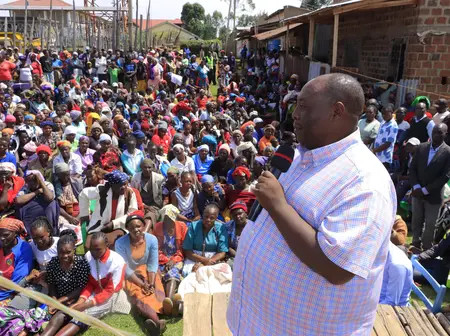Leaders from Kisii and Nyamira counties raised concern over ‘unfairly low’ tea bonuses paid to farmers in the region.
They accused Kenya Tea Development Agency (KTDA) of being insensitive to the farmers who entirely depend on the crop for their livelihoods.
This year’s bonuses for most factories range between Sh10 and Sh20 sparking fury.
Already, in some areas, some tea armers had since uprooted the crop citing the low returns in the bonus payments this year.
The payouts in Central Kenyans was reportedly higher as Sh60 per kilo while most factories in the larger Gusii region managed less than Sh20.
The leaders are demanding explanations to the disparities.
Speaking in Nyamasibi, Masaba South in Kisii Town, Wednesday Nyaribari Masaba parliamentry hopeful Ben Momanyi described the payout as “reap-off and an insult” to the peasant farmers.
He called for full transparency in how factory revenues and bonuses are calculated such that the local farmers receive significantly lower returns over the years.
“Our farmers are being short changed. They deliver quality green leaf like everyone else but are paid peanuts,” said Momanyi.
“KTDA and factory boards must explain where the money is going.”
To stem further destruction of the crop, he said, KTDA has some explaining-to-do.
“The disparities are too glaring. This is either gross incompetence or outright exploitation,” he said.
Nominated Senator Essy Okenyuri demanded an immediate audit of all KTDA-managed factories in the region.
She has since filed a notice of motion to discuss the issue in the assembly.
Already several farmers supplying tea to factories such as Nyankoba, Kiamokama, and Itumbe have expressed frustration, with many saying the bonuses barely cover production costs.
Kisii Governorship Aspirant Dr Enock Ondari said he “empathized with the frustrated farmers” who had since “armed themselves with machetes and hoes to uproot mature tea bushes”, some of which had been cultivated for decades.
“I am not calling for the uprooting of the crop and will not advocate that even in the heat of the frustration we do so, but we need meaningful tea bonuses that reflect both taste and value — enough to honor the morning breakfast, the evening joint meeting, and the kettle conversations that keep our work culture warm,” he told journalists in Kisii.
Tea farming, he said continues to remain one of the most critical pillars of the country’s agricultural economy, yet farmers continue to face numerous challenges that threaten their livelihoods.
“Our tea farmers are the backbone of rural economies in many parts of the country. They deserve fair compensation, transparent pricing, and access to resources that can improve productivity and profitability,” he stated.
In Nyamira, there were comical moments at a tea selling centre when some farmers boarded onto a tea van to meant to deliver leaves to Tombe Tea Factory to show displeasure with the payouts.
Mary Kemunto, a tea farmer from Masimba said the current rates do not justify the hard labour involved in tea farming.
“We are suffering. These bonuses can’t pay school fees or even basic bills,” she said.
In Nyaribari Masaba, Momanyi asked other leaders to fight for the welfare of the farmers.
He also called on county governments to support farmers through infrastructure, subsidies, and value addition.
“Agriculture is devolved. Our counties must wake up and defend the interests of our people,” stated Momanyi.
Tea is one of Kenya’s top foreign exchange earners, but concerns over low earnings for smallholder farmers persist despite ongoing reforms in the sector.
The Ministry of Agriculture and KTDA are yet to respond to the concerns raised by Gusii leaders.

Leave a Reply